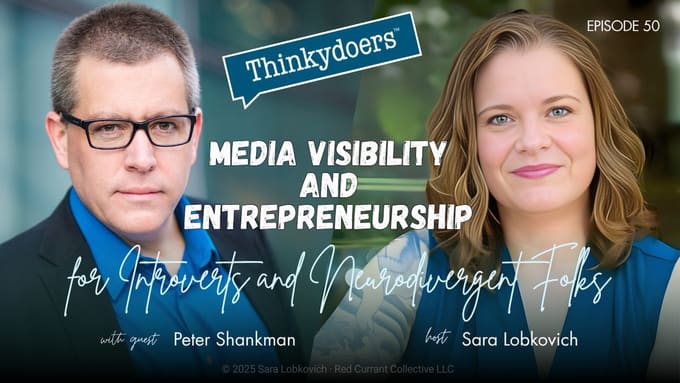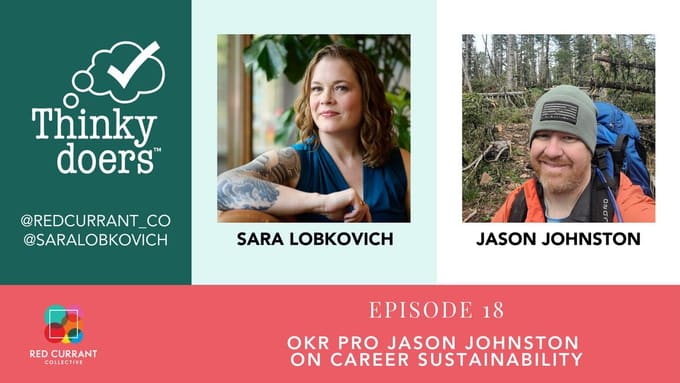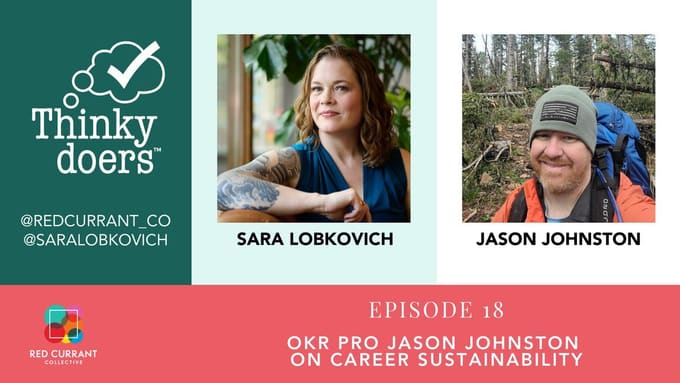Feeling Stuck: Signs and Symptoms Not to Ignore With Dr. Sherlonda Adkins
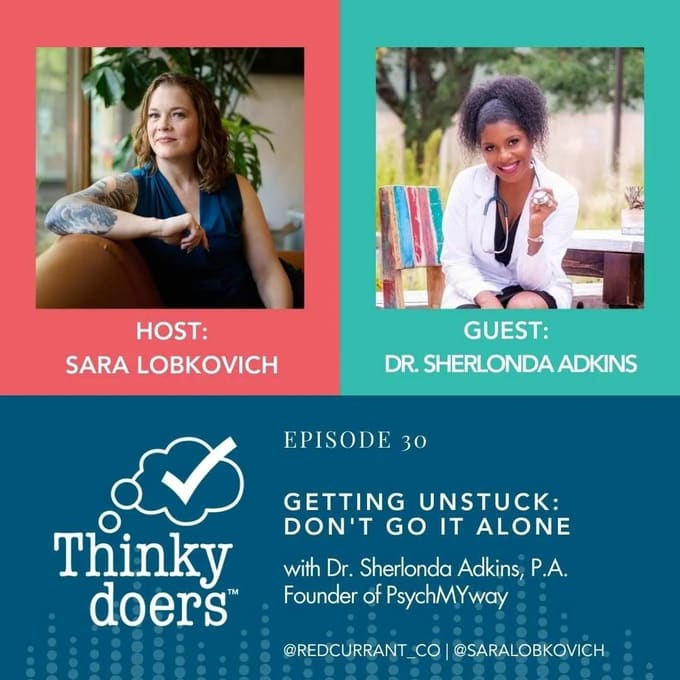
Ever felt “off” but couldn’t quite name it? Did it feel like you were “stuck?”
What if that feeling of being “stuck” is actually trying to tell you something important?
In this illuminating conversation with Dr. Sherlonda Adkins, a Physician Assistant and “Unstuck Strategist,” we explore how feeling stuck can masquerade as depression, anxiety, or burnout - and why recognizing the difference matters. Whether you’re questioning your career path or feeling stagnant in life, this episode offers vital insights into identifying and understanding stuckness before it impacts your wellbeing.
Then join us for part two with Dr. Adkins where we’ll explore practical strategies for getting unstuck and creating positive change in your life.
Episode Highlights:
-
The difference between clinical depression and feeling stuck
-
Physical, emotional, and mental signs of stuckness
-
How “sticky thinking” patterns keep us trapped
-
Why career transitions and family dynamics are common stuck points
-
The relationship between substance use and feeling stuck
-
Why being stuck isn’t always negative - it can signal important life changes
Common Questions:
-
What are the signs of being stuck vs. depression?
-
How does stuckness show up physically in our bodies?
-
When should you seek professional help for feeling stuck?
-
How can you tell if you’re experiencing sticky thinking?
Notable Quotes:
“Sometimes people end up sitting on my couch saying ‘I’m depressed,’ thinking it’s neurobiological changes, when in fact it’s more secondary to their feeling stuck.” - Dr. Adkins
“Suffering is different from going through tough times - suffering means you’re not accessing available relief while going through difficulties.” - Dr. Adkins
“Sometimes being stuck is jolting because you recognize there’s a misalignment between your compass and your soul.” - Dr. Adkins
About Today’s Guest:
Dr. Sherlonda Adkins is a physician assistant and unstuck strategist based in Charleston, South Carolina. Through her telemedicine practice and coaching work, she helps people around the world create lives they don’t need to escape from.
Resources Mentioned:
-
Dr. Sherlonda Adkins Website: drsherlondaadkins.com
Sara’s Links and Resources:
-
Join this Fall’s Goal Fridays free live series: https://findrc.co/goalfridays
-
The No-BS OKRs Workbook, currently available as a PDF download from https://findrc.co/pdfworkbook (USD) or https://findrc.co/pdfwkbkAUD (AUD)
-
Join the Launch Squad for Sara’s Upcoming Books: You Are A Strategist and the No-BS OKRs Workbook
Full Episode Transcript:
Sara: Welcome to the Thinkydoers podcast Thinkydoers are those of us drawn to deep work where thinking is working. But we don’t stop there. We’re compelled to move the work from insight to idea, through the messy middle, to find courage and confidence to put our thoughts into action. I’m Sara Lobkovich, and I’m a Thinkydoer. I’m here to help others find more satisfaction, less frustration, less friction, and more flow in our work. My mission is to help changemakers like you transform our workplaces and world. So, let’s get started.
Sara: All right, friends, we have another extra special treat with an amazing subject matter expert joining us today. Before we get into the episode with Dr. Adkins,If you’re listening to this when it’s coming out in October of 2024, then I would love to invite you to join me for my [00:01:00] goal Fridays series
That’s happening between now and November 15th. Live on LinkedIn and YouTube. And if you’re listening to this later, you can catch the replays.
And I’m also going to be doing some live objectives and key results audits and workshopping. So if you are interested in getting a little bit of feedback or participating in one of those lives with me as an example free coaching client,
This is a great chance to get some help with your objectives and key results,
For the dish and to RSVP, you can go to saralobkovich.com/goalfridays, and I’ll put that link in the show notes. Now, I mentioned today’s special guest, we’re continuing on the theme of mental health with our next guest, Dr. Sherlonda Adkins.We’re also continuing with the two part episode thing, but I’m going to try and get these two together back to back instead of over the course of two weeks.So, check back [00:02:00] for the second half of my conversation with Dr. Adkins. Dr. Adkins shares her very classically Thinkydoers career journey to becoming a physician assistant and a strategist in unsticking. In this first part, we’ll dive deep into the idea of being stuck, we’ll explore signs and symptoms of stuckness,And we’re also going to talk about some of the conditions that stuckness can masquerade as, and really just get to know some of the signs and symptoms of stuckness that we might be living with when really we might not need to.
in our second part, we’re going to talk about. Actually getting unstuck.
But before that, let’s meet Dr. Adkins and get into the first part of our conversation. Dr. Adkins, I am so delighted to have you help my listeners learn a little bit more about stuckness and mental health So before we dive in with my questions, though, I would love to just have you [00:03:00] introduce yourself.
Dr. Adkins: Absolutely. And thank you for allowing me to be here and keep doing the amazing work that you’re doing. so let me just a short cliff notes version of who I am. I reside in Charleston, South Carolina. I’ve always lived in South Carolina, and my journey is one of the unstuck strategists. It actually was born out of really just the life I live. It’s not just a brand; I am living proof of. to be unstuck.
I left home, moved from the upstate to the low country to attend college. Didn’t know anyone there, didn’t have any friends going there because I knew even at an early age that I just wanted to do something different to break outside of my geographical space. And I met my husband during my freshman year. We got married, and we’re about to hit year 27.I majored in communications because I had no clue what I wanted to do, but I figured whatever I ended up doing, I would need to be able to speak and write. So I decided to major in [00:04:00] communications.
I later went back and got my master’s in public administration because I thought that I could save the world, or at least contribute to saving the world through working in nonprofit or through public policy. But by that time, we had our second child, and the cost of me moving from being a stay-at-home mom to having two kids in daycare didn’t justify me even getting a job in the public sector, which led me to feeling stuck at this point. I’m like, I have two degrees, andjust that whole crisis thing.
Meanwhile, some of my friends were like, “You’re lucky you get to stay home with your kids.” And I’m like, I love my kids, but I need that social and intellectual stimulation for my brain. I’ve done a lot of different things in my life. I’ve done everything from being a motivational speaker with monster. com, I worked as a real estate sales agent, as well as a real estate investor. I had my husband, I had our own businesses in real estate. I’ve worked as an instructor for adult education, moved up to program director, and then up to director of career services.
And then I would [00:05:00] say my most prominent career move was when I decided to become a
PA.
And that came through just talking to some friends and everybody just brainstorming on, what I want to do. What do we want to do when our kids get older? And someone said, well, my husband said, I should look at becoming a PA. And I was like, “What’s a PA?” And I’m like, “Oh, I have one of those. I have a PA.”
So I started doing some research. And one thing about me, and probably a lot of your listeners too, is when I am interested in something, like I will hyper-focus and I will research the mess out of it and find like everything. Like I am really quick at being able to do a deep dive. And so I did a deep dive on becoming a PA, the daily life of a pa.
And what resonated with me about the PA profession as opposed to being a nurse practitioner or even going to medical school is that we could make lateral changes without having to stop and go back to school. So if you’re an MD, you specialize in orthopedics, but if you decide you wanna work in pediatrics, guess what? You have to go back and do a residency. But as a PA, you’re trained as a generalist, meaning that we’re trained for behavioral [00:06:00] health, we’re trained for, women’s health, nephrology, pulmonology, like all the systems of medicine.
And that appealed to me and my brain because I had a feeling that after working in a particular specialty for a few years, I might want to switch, and I wanted to have a career that would accommodate that, which I knew about myself.
So I became a PA. And while I was in PA school, I wrote down some specific goals. One of them was that I want to work part-time hours with full-time pay. Yes, I did go there. And I also said that I didn’t want to work nights or weekends, and I wanted to be close to home so that I could be available for my kids because by that time, we had three kids.
So I wrote these things down and also said that when I got a little more experience under my belt, I wanted to be able to travel because I, had heard one of my friends, whose husband was a doctor, that they would do these things called locum tenens so they could go and work in different locations. Fast forward, I graduated from PA school 10 years ago, and I was blessed with the opportunity to have two part-time jobs, [00:07:00] one in internal medicine and one in psychiatry. Neither one I found on Indeed or a ZipRecruiter or anything, but it was through just talking and being in the right spaces and knowing people. And I ended up decreasing my hours in internal medicine as my psychiatric patient load began to increase, and I also like the pace of that a little bit better. I did miss with internal medicine the holistic view of medicine because psych is more specialized. And as a psychiatric PA, I’m a bit of a unicorn because less than 2 percent of PAs in the U. S. work in psychiatry.
in 2019, because I love to travel,I was out of the country. I went on five international trips, plus went to Hawaii because our daughter was there doing one of her rotations; she’s a pharmacist. And so I was out of the office a lot. And as an independent contractor, when I’m out of the office, I don’t get paid. And in addition to that, when I’m out of the office, my patients are like, “We didn’t want to see the other provider, but we wanted you, we just had to.” And believe me, I did work it out to where it’s okay, I’m going to be traveling, so let’s schedule these appointments out.
But sometimes things happen. So I went to [00:08:00] my supervising physician and I said, “I was thinking about something. This is one area of medicine where we’re not like touching patients. We’re not auscultating. We’re not palpating. Can we look at maybe doing some type of remote option so that when I’m not here, I can still work like an abbreviated schedule?”
And he said, “What do you mean? Talk to patients on a video?” I was like, yeah, that would never work. This was 2019. Okay. This is before we found outa few months later we were going to be in a pandemic. So I was like, Oh. I was a little deflated with that. And then I said, my brain started going, I’m thinking, is there a way that this can be done?
Because really, when my patients miss their appointments, they’re not missing because they’re not wanting to continue with their care. They’re not wanting to be on their medications. They’re missing for legitimate reasons. Where we live at, if it rains for more than 15 minutes, it’s probably going to be a flood in downtown. We have traffic. I have college students who are away. I have parents who can’t get babysitters. And then the stigma of sitting in an office. Charleston’s not a huge place, so it wasn’t uncommon for people to sit in offices like, oh my god, that’s my neighbor. oh my god that’s my coworker. So there were [00:09:00] reasons where people didn’t come.
So I just started doing the research. And as if I needed anything else to add to my plate, I was like, you know what? I think I’m going to start my own practice. So in 2020, in January, I launched South Carolina’s first PA on telemedicine practice. And we’re four years into that. It was just a beautiful moment because I would love to say that I was so smart and I was on the cutting edge stuff or whatever, but it’s not. It was a divine direction for me to take and I launched a practice, and then we went into the pandemic and there we are, everybody’s doing telemedicine now.
So in addition to telemedicine, I’ve always had a heart of a healer. Even going back to elementary school, being on the playground, and someone who’s being picked on or it seems isolated, I would go up like, “Hey, you want to come be our friend?” Like that type of thing. And that has been a gift that’s been a part of me all of my life, and then it’s been married with the additional skill set that I’ve gained and becoming a PA. And with that, I have been able to do coaching. So I helped people, but a lot of [00:10:00] my clients are women around the world to get unstuck and create lives they don’t have to escape, and unstuck could be anything. It could be if they feel they’re stuck in their thinking, like sticky thinking it could be in relationships, dealing with their emotional health. It could be geographically because believe it or not, some people sometimes feel geographically stuck and just how to put together a plan to expand life. I try really hard to do it like a two-minute introduction, so hard to do it because I feel like there’s so much just in my story that can speak to a wide variety of people.
Sara (2): I’m so delighted you didn’t give us the short version because I love hearing other people’s non-linear careers. That was something I got a lot of crap for —that I had a non-linear or a winding career —but I think it takes that for us to find what we were born to do. And so I hear that in your story too.
Dr. Adkins: Good, that is that’s wonderful. And you answered the [00:11:00] question because my question was going to be to you: Did you ever question yourself or start to think there’s something wrong with me? Because I went through that for years, because what was modeled was, you go to college, you graduate, you get a good job and you stay at that job. Or maybe you might switch one time. But for me, it was like, I’m trying this, this fits for now, but it doesn’t fit. And so it was always like that constant pursuit and match. And sometimes it’s there for a while, and then sometimes it shifts. I was really beginning to think, is like legitimately, is there something wrong with my brain? Is there something inherently wrong with me, that I started telling myself this narrative of, you don’t stick with things.
Sara:
Dr. Adkins: You’re okay, don’t get too excited now about it because you’re probably not going to stick with it. And it took a lot of work, like a lot of inner work andlistening to the voices I could trust, like those who really know me and love me, in therapy as well to say, oh no, honey, this is my superpower.
Sara: This business exists because I was out for a dog walk one day and [00:12:00] listening in on a work call. And my brain said, instead of saying, what’s wrong with me, my brain said, what’s wrong with this environment that I am feeling this way? And I was like, wait, what? Can you speak a little louder? That voice I want to hear more of because I’ve been hearing what’s wrong with me for my entire 30 years of my career. When you say, I had that message of what’s wrong with me, that’s my listeners, they’re us, they’re the people who struggle with those thoughts until they find how to unstick themselves from it. But Dr. Adkins, tell me what a PA is and what your scope of practice is and what you do.
Dr. Adkins: Okay. So, Physician Assistant: we are trained in the medical model. Most of our programs are anywhere between 27-30 months and it is rigorous program that we go straight through with no breaks, so we are trained on every body system, from the [00:13:00] brain to skin to everything. And so our curriculum consists of didactic portion where it’s all in the classroom and we’re learning. And then we have rotations where we go out and each of the specialties and get hands-on experience. So we work under the supervision of a physician, and that varies state to state. So some states have tighter laws, some states have looser laws. And under the supervision doesn’t mean that the, physician has to be actually even on premises, but it just means that we have someone who’s like responsible for us. And I absolutely love that because I love collaboration. When I talk to students who are interested in becoming PAs I always mentioned to them, if you’re somebody who’s like, “I want to be the head person in charge all the time,” then, probably go to medical school. But as far as like becoming a PA, some people find that’s limiting in that sense. But in the state in which I live, so I have a supervising physician who is awesome by the way, but we don’t, he doesn’t have to like double-check behind me and see patients. So [00:14:00] I see patients on my own. PAs are able to diagnose and formulate treatment plans for patients autonomously. You’ll find them everywhere. You have PAs in the operating room, you have PAs in pediatric offices, so everywhere. for me, it was the flexibility that attracted me and the ability to combine the science and my heart together. But yeah, so I represent the profession of PAs in the U.S., and it’s also a profession that’s found in other countries as well.
Sara: So we’re going to talk about unsticking, because that’s one of your superpowers.
Dr. Adkins: What are some signs and symptoms of being stuck that people might not recognize?
So, some of the ones that I would say are probably the most common first indicators that are easy to miss if you’re not in tune and like aware of like feelings and what they could mean would just be boredom. Just feeling blah going throughout your day. And then even just [00:15:00] irritability, feeling angry, feeling sad, no motivation. And as I’m naming these things, you might be starting to think, that kind of sounds like depression. And sometimes people end up sitting on the medical side, on my couch or my, I had a physical couch or my virtual couch and they’re saying, I’m depressed. And thinking that it’s possibly related to some neurobiological changes that are occurring when, in fact, it’s more secondary to their feeling stuck. Oftentimes in their career—it’s not always career—but I see that probably the most, career and then family dynamics. Two of the places that you just don’t have the ability to exit out of and stay out, like most people have to work, and you don’t get to just quit your family. We talk about like quiet quitting. Sometimes we quiet quit, but you can’t quit them for real. And those are like two of the key areas that I see people showing up, saying, I think I’m depressed. And that’s why it’s good to ask a lot of questions in terms of history to [00:16:00] figure out: if you’re telling me you don’t really have a family history of depression, you’ve never really dealt with this before, but you notice when you relocated to Charleston that the last year this is what’s been happening. So it’s easy to point and say, you might just be feeling a little bit stuck. So those are just some of the overall indicators that people may not realize they’re stuck. It’s just feel bored, or I’m just not content with life. Like I, I do things that I used to do, but it don’t bring me joy. Like, someone bought me tickets to a concert, and everybody knows I love Elton John. I got tickets to Elton John’s concert, but the whole time I was there, I was just thinking, oh my God, when this is over, I just want to go back in my bed. That’s an indication. And then moving on to like more of the mentality and thinking.
So we mentioned earlier, talking about sticky thinking is when you find yourself having the same dialogue over and over, the same narratives that you tell yourself. Sometimes people will start to build a life around the sticky thinking. So, if I think that people are always going to talk about me and say things [00:17:00] negative, or people are going to think that I think I’m more than what I am, then maybe I’m going to start limiting how much I interact with people in a social environment, because I don’t want them thinking that. Who told who? Where is the evidence? There’s some type of evidence that we have created in our own minds that leads us to the sticky thinking, and it can, like, just—keep you stuck. . So, really paying attention to thinking can oftentimes bring out okay, I’m stuck. Then we haven’t mentioned the physical body. Sometimes feeling stuck, some of those physical symptoms—we have issues with sleep, sometimes not being able to sleep, or difficulty falling asleep because your mind is still replaying things, projecting into the future. Or it’s okay, you can go to sleep, it’s fine, but then you wake up in the middle of the night and you’re thinking, your brain’s going. On the other end, sometimes people will oversleep, and not necessarily because they’re tired, but you could get 12, 14 hours of sleep and still just feel tired. [00:18:00] Increase in substance use—not not even just, sometimes people think more like illegal drugs, but caffeine. Anything that alters your brain chemistry is considered like a drug for my purposes. And alcohol—finding that you’re needing more alcohol to wind down at night or you needing coffee to boost you.Those are some of the physical symptoms. And then really just checking in with your body. I like to give this example: if you are driving down the road and all of a sudden you look in your rearview and police lights coming up behind you and they’re flashing, most people will have some type of physiological response. I don’t think I’ve really met anybody who’s like, oh, I’m just chill. Usually, some things will happen—your heart rate increases, you might start sweating, breathing gets shallow and more rapid. So with sticky thinking and being stuck, sometimes people experience those physical symptoms as well. If it’s the case, mentioned —emotions, and then you have the mental thinking, and then you have the physical—if all three of those are [00:19:00] combined, you’re in a pretty tough place. And I would say if anyone listening to this say, I think I’m experienced like a little bit of all of those, I would definitely encourage you to seek some professional help with that because it means that you are struggling. We’re all going to go through tough times, but there’s a difference between going through tough and painful times and then suffering. Because suffering is like, you have an opportunity, there’s some relief for it to help you while you go through the difficulties. But for the most part, I think we ebb and flow a little bit. I don’t necessarily think that being stuck is always a bad thing because sometimes being stuck, at least in my life, and I’ve seen it in the lives of my patients, and my clients, and my friends and family, is that it’s jolting once you realize that you’re stuck and you’re like, “Oh,” because you recognize that there’s a misalignment. between your compass and your soul—where you’re supposed to be going and where you are at the external environment. Those are just briefly some of the signs and symptoms [00:20:00] of what it looks like being stuck. And because we aren’t that good at looking at ourselves, sometimes we don’t even know that we’re stuck until we have someone pointed out to us. Sometimes it’s the people who are closest to us who can recognize and say, “I noticed that your garden looks bad out there. You used to take pride in that. You posted pictures on social media of your garden, and your garden is not gardening anymore.”
There’s two postures you can take with that. If you’re open to receiving like constructive criticism, you can go, “Gosh, I didn’t notice thanks for telling me.” But sometimes if we already have that awareness and we’re already self-conscious about it, and somebody points it out, it can lead to feeling like a little defensive, and then you want to protect it even more. But yeah, so having at least one or two people who can tell you things in love, and not out of judgment or to make you feel bad, to point things out, can be extremely valuable in helping you identify your stuckness and the areas in which you feel stuck, because you can be [00:21:00] stuck in multiple areas of life.
Sara: Alright, thank you so much for joining us on this episode of the Thinkydoers podcast. As always, links to the resources that we talked about are in the show notes. You can find those at findrc.co/thinkydoers. If you enjoyed this episode, please subscribe, rate, leave a review on your favorite podcast platform. It really does help us be seen by more people. And then don’t forget to come back for our next episode where we continue this conversation with Dr. Adkins, where we’ll dive into practical advice for seeking help and getting unstuck. So until then, take care, and I’ll see you back here soon.
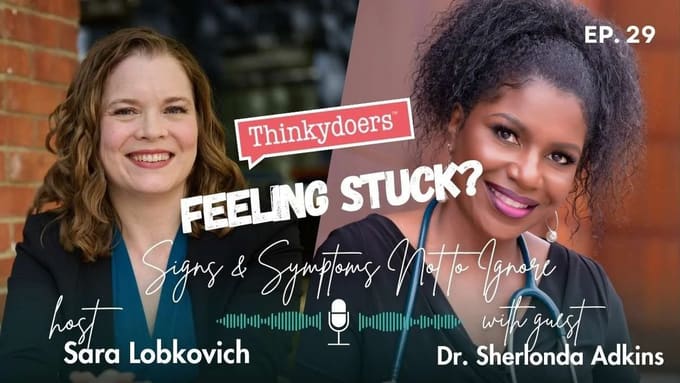
Thinkydoers Podcast Episode 29 graphic — Feeling Stuck with Sara Lobkovich and guest Dr. Sherlonda Adkins, discussing strategies to move forward when you feel stuck.
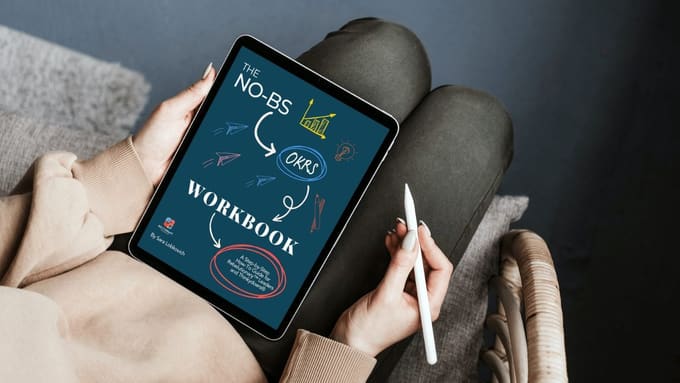
You don’t have to OKR alone!
Snag a copy of the No-BS OKRs Workbook PDF NOW for only $19 USD, and get started working with OKRs today!
Prefer a short course? Check out our fully-independent and self-paced short course (regularly $99, now only $49)
You do not have to OKR alone! And, I’d love to help!
-Sara Lobkovich , OKR Coach & Principal Consultant
Best OKR Books of 2025
Curated reading list of the most impactful books on OKRs, strategy, and goal-setting. Includes classics and new releases with honest reviews.
See the List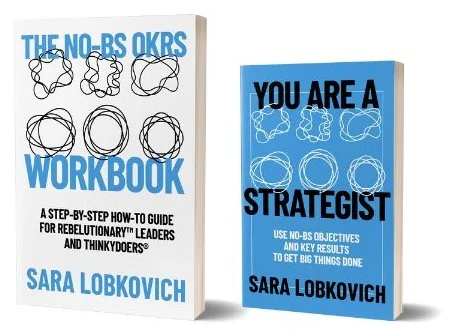
Get the Book
You Are a Strategist teaches you how to use No-BS OKRs to get big things done. Join 2,000+ coaches trained in this methodology.
Order Your Copy